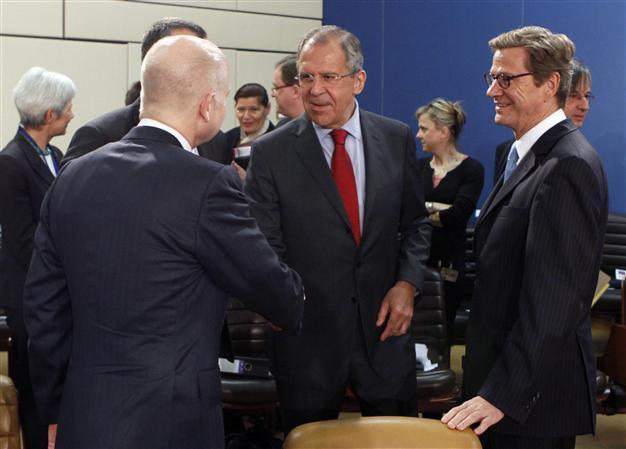NATO, Russia hold talks on missile shield, Syria
BRUSSELS - Agence France-Presse

Britain's Foreign Secretary William Hague (L-R) shakes hands with Russia's Foreign Minister Sergei Lavrov in front of Germany's Foreign Minister Guido Westerwelle at the start of a NATO-Russia meeting during a NATO Foreign Ministers meeting in Brussels April 19, 2012. REUTERS/Sebastien Pirle
NATO allies sought to deepen cooperation with
Russia today despite lingering disagreements on a US-led missile shield for Europe and Western pressure on the Moscow-backed regime in
Syria.
As violence continued in Syria despite the deployment of UN truce observers, US Secretary of State Hillary Clinton and her 27 NATO counterparts began talks with Russian Foreign Minister Sergei Lavrov in Brussels.
British Foreign Minister William Hague called on the regime of Syrian President Bashar al-Assad to respect a ceasefire agreement after UN Secretary General Ban Ki-moon said that Damascus had not fully complied with it.
"We look to Russia to continue pressure on the regime to comply with that ceasefire," Hague said, adding that he expected the situation in Syria to be discussed during the talks with Lavrov.
Russia has backed a UN Security Council resolution that endorsed the deployment of a first group of 30 unarmed observers after vetoing previous UN initiatives to condemn the regime's crackdown on dissidents.
Ban wants to expand the mission to 300 observers for a three-month stint and will present his plan to the council on Thursday.
NATO allies and Lavrov were not expected to make progress on another thorny for both sides, the missile shield that the alliance is pressing ahead with despite Russian criticism.
Asked on arrival at NATO headquarters what he expected during talks, Polish Foreign Minister Radoslaw Sikorski replied curtly: "Not much." Moscow fears that the system would thwart its nuclear deterrent but the United States and its allies insist that the shield is aimed at protecting Europe from Iran and other unfriendly states, not Russia.
"It is well known that what we do not agree on all issues but it is also clear that we are committed to continue discussing all issues at all times," NATO Secretary General Anders Fogh Rasmussen said at the start of the talks.
"This system does not threaten Russia, nor does it alter the strategic balance," Rasmussen said.
NATO leaders are hoping to declare the start of an "interim capability" for the missile shield at a summit in Chicago on May 20-21. The alliance had hoped to invite Russia's president-elect Vladimir Putin but he is unlikely to attend, with NATO officials citing the Russian leader's busy political calendar.
